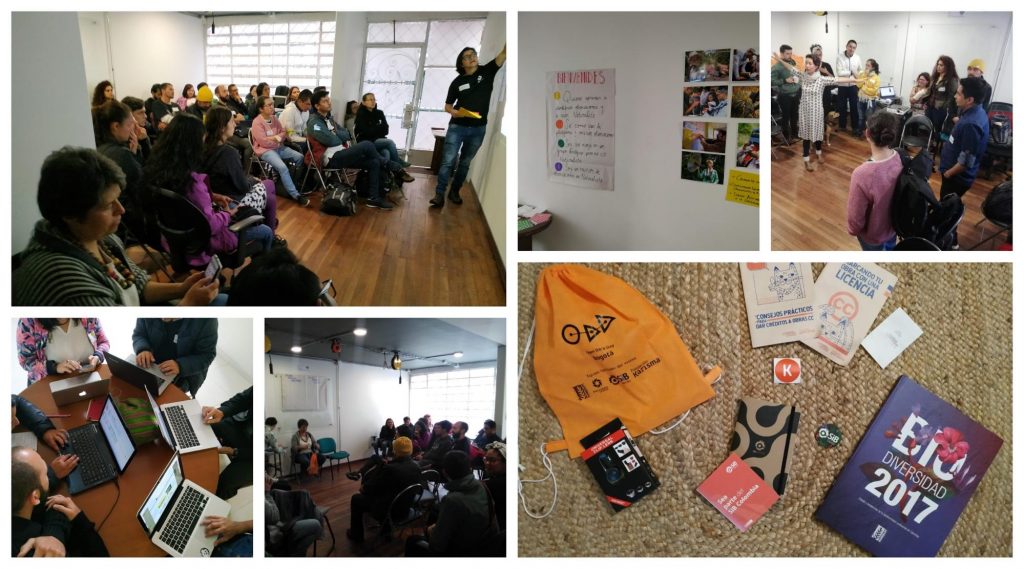This report is part of the event report series on International Open Data Day 2019. On Saturday 2nd March, groups from around the world organised over 300 events to celebrate, promote and spread the use of open data. The Karisma Foundation from Colombia received funding through the mini-grant scheme by the Frictionless Data for Reproducible Research project to organise an event under the Open Science theme. This report was written by Karen Soacha: her biography is included at the bottom of this post. The original Spanish version is published at https://karisma.org.co/dataton-naturalista-bogota.
Open data, naturalists and pizza were part of the Open Data Day celebration in Bogotá
Why and how to improve the quality of open data on biodiversity available in citizen science platforms, were the questions that brought together more than 40 naturalists in the event organized by the Karisma Foundation, the Humboldt Institute and the Biodiversity Information System of Colombia (SiB Colombia) on 2nd of March 2019 as part of the global celebration of Open Data Day.
Expert naturalists, amateurs and those interested in citizen science came together to review the open data generated for Bogotá through the City Nature Challenge 2018. The City Nature Challenge is an annual event that invites city-dwellers across the world to hit the streets for two days to capture and catalogue nature which they might be too occupied to notice otherwise. Using their smartphones, hundreds of people generate thousands of observations of plants, birds, insects and more, which they share through citizen science platforms such as iNaturalist. Generating the data is just the beginning of the process: improving its quality, so that they have the greatest possibility of being used, is the next step.
During the Naturalist Datathon we shared guides to facilitate the identification of species, tips to review observations, as well as good practices for users and reviewers to improve the quality of the data. After a morning of collaborative work, the groups shared their learning and engaged in a discussion about the importance of data quality and its potential use in environmental monitoring especially in the context of environmental issues in Bogotá.

The Datatón Naturalista left us with a set of outputs, specific lessons learned and a set of good practices for the participants, the organizers and the community of naturalists and open data. To begin with, this activity contributed to increasing the community of experts who actively participate in the “curation” of observations published in Naturalista Colombia, which is necessary in order to improve the quality of the data. At the end of the datathon, the quality of the data the participants worked on was vastly improved — so much so that the data will be integrated into the SiB Colombia (the official national continental biodiversity portal). As a result of this datathon, more Colombians were encouraged to participate as urban/rural naturalists.
Participants also shared good practices for taking photographs and collecting data necessary for observations to be useful for multiple uses, they mentioned the importance of use licenses for facilitating the reuse and sharing the information (Creative Commons). They also gave recommendations for the 2019 City Nature Challenge (CNC), such as the need for guides in easy-to-consume formats (such as short videos) that ought to be shared in advance of the CNC. This guide should go beyond basic information on data capturing, and should include good practices, as well as ethical recommendations for the creators, curators, and users of information. One of the challenges that the participants highlighted was the need to recognize and integrate citizen science data as a source of information for the environmental management of the city.
For the organizers, the datatón turned out to be an effective means to create conversation, connections and reflections on the how and for what of the open data, at the same time that allowed to strengthen capacities and contribute with open data of quality.
Finally, this event showed that more and more citizens are becoming involved in citizen science, actively contributing to our knowledge of biodiversity, and are working collaboratively to further understand their environment and to generate information that is useful for decision-making. Therefore, it is necessary to continue promoting spaces that allow community-building and facilitate networking around open science and citizen science. For that reason, we in Bogotá are looking forward to the next Open Data Day.
Biography
Karen Soacha is interested in the connection between knowledge management, citizen science, governance and nature. She’s been working with environmental organizations for over 10 years, in the management of data and information networks, especially with open data on biodiversity. She is convinced that science is a way to build dialogue within the society. She is also a teacher, an amateur dancer, and an apprentice naturalist.
Open Data Day is the annual global celebration of open data. Each year, groups from around the world organise local events to celebrate, promote and spread the use of open data in their communities. It is an opportunity to show the benefits of open data and encourage the adoption of open data policies in government, business and civil society.
Email opendataday@okfn.org to contact the Open Data Day team.









